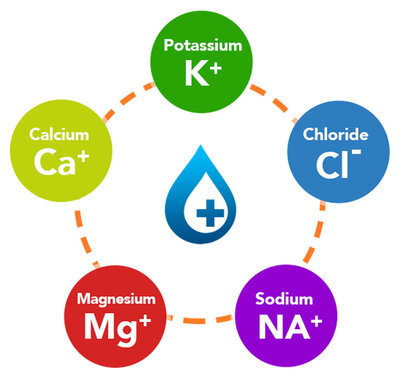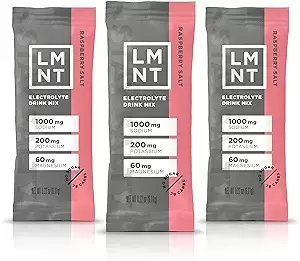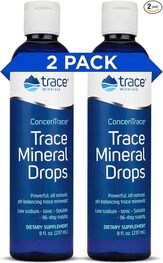Electrolytes are essential minerals. They include sodium, calcium, potassium, magnesium, and chloride. Electrolytes are involved in maintaining proper hydration, muscle and brain function, and nerve conduction.
Mineral drops are a great example of electrolytes, and are generally derived from dehydrated sea water or salt lakes and are rich in magnesium and smaller quantities of naturally occurring minerals including potassium, sodium, and trace amounts of 70+ other elements. They are an excellent source of chloride, which is one of the main electrolytes. Chloride performs many roles in the body and must be constantly replenished. It combines with hydrogen in the stomach to make hydrochloric acid, a powerful digestive enzyme responsible for the breakdown of proteins, absorption of minerals, and activation of intrinsic factors, which help to absorb vitamin B12.
Mineral drops are a great example of electrolytes, and are generally derived from dehydrated sea water or salt lakes and are rich in magnesium and smaller quantities of naturally occurring minerals including potassium, sodium, and trace amounts of 70+ other elements. They are an excellent source of chloride, which is one of the main electrolytes. Chloride performs many roles in the body and must be constantly replenished. It combines with hydrogen in the stomach to make hydrochloric acid, a powerful digestive enzyme responsible for the breakdown of proteins, absorption of minerals, and activation of intrinsic factors, which help to absorb vitamin B12.
supplementation
Mineral Drops
Begin with anywhere from 1 drop to a few drops in a glass of filtered water and slowly increase to ½ - 1 tsp. or more as desired, to drink at convenient intervals. Alternately, add ½ - 1 tsp to 1 quart (or approx 1L) of filtered water to sip on throughout the day. Mineral drops are not temperature sensitive and can be added to soups or other foods and beverages. They are also great for re-mineralizing distilled or RO water; however, once remineralized, additional drops must be added to boost the mineral content of the water to supplemental strength (see product label for suggestions).
Long term: With time, most people find that ½ - 1 tsp (2.5 - 5mL) in filtered drinking water is a suitable dose, and many will sip throughout the day. Some choose to split their daily amount into portions morning and night (or at other intervals to suit their routine). Find the way that works best for your schedule to get a consistent amount daily.
Begin with anywhere from 1 drop to a few drops in a glass of filtered water and slowly increase to ½ - 1 tsp. or more as desired, to drink at convenient intervals. Alternately, add ½ - 1 tsp to 1 quart (or approx 1L) of filtered water to sip on throughout the day. Mineral drops are not temperature sensitive and can be added to soups or other foods and beverages. They are also great for re-mineralizing distilled or RO water; however, once remineralized, additional drops must be added to boost the mineral content of the water to supplemental strength (see product label for suggestions).
Long term: With time, most people find that ½ - 1 tsp (2.5 - 5mL) in filtered drinking water is a suitable dose, and many will sip throughout the day. Some choose to split their daily amount into portions morning and night (or at other intervals to suit their routine). Find the way that works best for your schedule to get a consistent amount daily.





